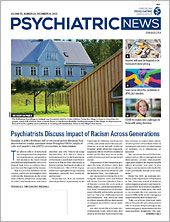Feeling “different” from the people around me is not something new to my lived experience. As a person of color in the white spaces I frequently navigate, it has, at times, become my sole identity and a conversation starter. My story of resilience and being an “underrepresented minority” for the past few years for the most part has been met with praise and kindness, a stark contrast from the previous life I had before entering medical school. In the past, my skin complexion came with assumptions of criminality, illegal immigration status, and preconceived notions of my own personal interest and culture. Now it comes with the confusion of being “exotic or special.”
In medical school, a world full of indulgence and privilege, I often thought less of my race and the challenges that I faced. It wasn’t until an all-too-cliché rainy evening that my race and cultural identity surfaced while attending my state’s annual psychiatry conference.
Before entering medicine, I always had a serious interest in mental health, specifically substance use and addiction. In the community where I grew up, which was predominantly Black and Latino, I witnessed how American drug policy destroyed my community and how unaddressed trauma reared its ugly head in a place too proud to admit its suffering. Reflecting on my experience of how the people I loved lacked the literacy, financial means, and support to address their suffering fueled my passion for chasing, what was in my adolescence, a hysterical fantasy: becoming a physician.
This experience came back full circle on an interesting, but oddly devastating, night, because what so long had been a positive aspect of my journey became a harsh reminder of the battle that psychiatry, and all of medicine, is facing. As I entered the hotel conference room, I felt uneasy. Glancing around the room, I couldn’t help but notice that there was only one other person of color in the room—a young Asian woman, one of the few psychiatrists whom I knew in the room. Being in a white space was nothing unique to me, but I also felt uneasy as the only person who had not gone through the rigors of residency and earned an M.D.
Upon entering circles of conversation, I fumbled through my sentences, caught a couple eye rolls, and even had folks walk away from me abruptly. Observing the behavior of others, I felt I was in the stereotypic high school class where the clique of popular kids gather to engage in the latest gossip. In what was supposed to be a night of making valuable connections to my network, I found myself flustered, uncharacteristically labile, and desperate for human connection.
As dinner was being served, the Asiant woman kindly let me sit by her for the presentation. As it went on, I was dead silent and a shell of myself. My attention fixated on the fact that only a third person of color was now in the room—a Black man who had been flown from Baltimore to give the keynote. For a moment, I felt I could breathe. Listening to his work on marijuana and hearing the stimulating conversation diverted my attention to why I was so excited to be there in the first place. Yet, the overwhelming emotion carried over my head like a haze.
When I finally got to meet this man after his excellent presentation, I blurted out, “I’m so thankful that you’re here because you’re the only other person of color I’ve seen.” After a somewhat awkward pause and a gesture of acknowledgement, I quickly got his information and ran out of there as fast as I could to cry in my car. I learned a tough lesson from that night.
Despite the hope I hold for the profession of psychiatry, the lack of diversity and elitist feel of this encounter burned me. The differences in the complexion of my skin, the credentials that I still lacked behind my name, and my far different lived experience mattered more than I think anyone who attended that evening would like to admit. Although the room was filled with incredible minds, innovators, and some of the finest the profession has to offer, I know that with time, change must come. What motivates me to continue pursuing a career in psychiatry is knowing that we can improve. Marginalized communities and the growing minority populations of this country depend on there being culturally competent health care professionals and health care professionals who look like them. Without that connection, we will continue to fail those who need us the most. Now, not later, psychiatry needs to bring in new faces and perspectives—and it starts with addressing that elephant in the room of race and a flawed culture that has kept progress far too slow for the likes of the year 2020. ■

